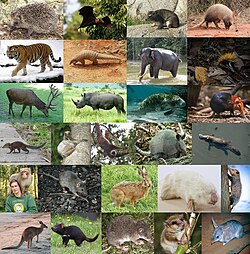Okambúva
Ojehechaháicha
| Mamíferos | ||
|---|---|---|
 Mymba okambúva opaichagua | ||
| Tekovekuaaty ñemohenda | ||
| Jueheguapa: | Eukaryota | |
| Tavetã: | Animalia | |
| Tavetãguy: | Eumetazoa | |
| Pehẽ'arusu: | Deuterostomia | |
| Pehẽ'a: | Chordata | |
| Pehẽ'aguy: | Vertebrata | |
| Jueheguasã: |
Mammalia Linnaeus, 1758 | |
| Subclases | ||
| [editar datos en Wikidata] | ||
Umi okambúva (Mammalia) ha'e mymba pujase'orekóva huguy akúva ikáma ojapo kamby omongaru hag̃ua imemby omokambúvo ichupe. Mymba okambúva hete haguepáva, omoheñóivo imembyrã, ogueraha ichupe ipype heñói peve, ha'ekuéra añónte ojapokuaa kamby imembýpe guarã.[1][2]
Ko'ágã ojekuaa 5486 mymba okambúva juehegua,[3] umívagui 5 ha'e umi ikuateĩva (monotremata),[4] 272 ha'e gua'amba (marsupialia)[5] ha umi ambuéva, 5209, ha'e auparekóva (placentalia).
Mandu'apy
[jehaijey | emoambue kuatia reñoiha]- ↑ Carroll, R. L. 1988. Vertebrate Paleontology and Evolution. New York: W.H. Freeman & Co. ISBN 0-7167-1822-7
- ↑ Benton, M. J. 2005. Vertebrate Paleontology, 3rd ed. Oxford: Blackwell Science Ltd. ISBN 0-632-05637-1
- ↑ Chapman, Arthur D. (2009) (en inglés). Numbers of Living Species in Australia and the World (2ª edición). Canberra, Australia: Australian Biological Resources Study. pp. 80. ISBN 9780642568618. http://www.environment.gov.au/biodiversity/abrs/publications/other/species-numbers/2009/04-01-groups-chordates.html#mammalia. Consultado el 26 de agosto de 2011. «Mammals are a quite well known group, however estimates for the numbers of described species still vary considerably, ranging from 4300 in Biodiversity: the UK Action Plan (Anon. 1994), through 4630 (Groombridge and Jenkins 2002), 5416 (IUCN 2004), 5419 (Wilson and Reeder 2005) to 5487 (IUCN 2009a). For the purposes of this report, I have accepted the figure of 5487 which accords well with the most recent figures from The IUCN Red List of Threatened Species although Hilton-Taylor (pers. comm. 17) suggests that there are several additional recently described species.»
- ↑ Tembiecharã:MSW3
- ↑ Animal Diversity Web - Metatheria
